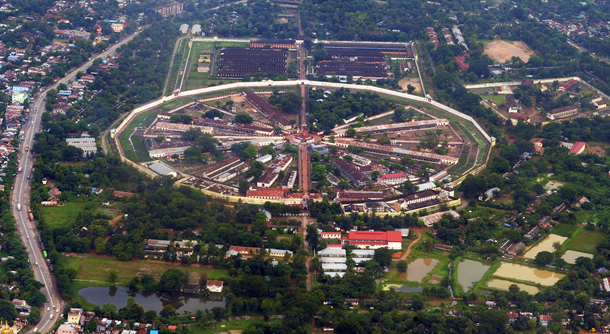The draft Prison Law currently being debated in Upper House of the Union Parliament does little to encourage hopes that the prison system is about to undergo the substantive reforms it urgently needs.
The current prison system and its regulations do not meet the United Nations Standard Minimum Rules for the Treatment of Prisoners (SMR), the standards set by international law, the legal provisions of other Asean nations, domestic laws of other countries and many other international declarations and United Nations conventions.
The draft law, supposedly aimed at changing the country’s outdated penal system, is deficient in many areas: its provisions do nothing to foster the drastic changes the prison system requires. The bill, already vague in its wording, is also utterly lacking in detail as to how prisons should be reformed to meet the SMR covenant.
Under the draft law, the administration of prisons will still fall under the sole responsibility of the Ministry of Home Affairs. This ministry retains too much control over the prison system, with the judiciary given no role to play in the observation and review of prison standards.
SMR 55 requires a framework for independent prison monitoring and inspection. Other regional governments have accepted this principle. Cambodia’s 2011 Prison Law, for example, puts prison oversight directly under the responsibility of the judiciary and an inspection regime that permits confidential interviews with prisoners and recommendations for improvements to conditions, for the purpose of “preventing torture and cruel, inhumane and degrading treatment.” These kinds of provisions are absent from the prison bill currently being debated.
Other vital oversight mechanisms are similarly lacking. There is no discussion of how the actions of guards will be reviewed, with the role of monitoring staff activity falling under the senior echelons of the Prison Department, and therefore the Ministry of Home Affairs.
The inclusion of an independent review mechanism is essential to the monitoring of prisons. Any future prison law in Burma must give the judiciary and other bodies outside of the ministry a role in ensuring that minimum standards are met, and give prisoners the opportunity to raise grievances outside of the Prison Department.
At present the rights of prisoners are ill defined. The only grievance procedure outlined in the bill gives prisoners permission to bring complaints to the prison superintendent, with no detail on how prisoners will make complaints or how complaints will be evaluated.
Torture is still used in the systematic oppression of detainees in Burma and is routinely employed to abuse prisoners and those detained in interrogation centers. Leaving aside the fact that Burma is yet to honor their commitment to signing the UN Convention Against Torture, the draft law makes sparse mention of the use of torture in Burma’s prison and the measures that should be taken to prevent it.
While the bill outlines punishments for prison authorities that commit acts of torture against prisoners, it stops short of prohibiting the use of torture itself. There must be stronger language in this law if we are to see an outright end to torture in detention, along with ensuring proportionate criminal punishments to deter prison staff from torturing inmates and detainees.
The UN’s Body of Principles for the Protection of all Persons Under Any Form of Detention or Imprisonment (BPP) states that prisoners should be granted access to basic adequate health care, a stipulation echoed in the universal health care provisions of Burma’s own Constitution. The status of medical care under the draft law, however, is questionable at best.
It makes no specific requirements for the standard and frequency of trained medical professionals to make prison visits. It does not require the Ministry of Home Affairs to ensure all prisons have access to medical and dental care. Instead, the onus for requesting medical care and checkups rests on prison administrators, whenever they see fit. The bill also makes no reference to the standard of food, clothing, bedding, water, sanitation and hygiene.
The UN’s Basic Principles for the Treatment of Prisoners (BTP) states that the standard of healthcare within prisons be the same as that in the public healthcare system—a fact that is clearly not the case in Burma, even despite the scandalously poor state of public hospitals and clinics in the country.
Many prisoners leave imprisonment suffering from ongoing health conditions, often made worse by the poor standards of food and healthcare in Burma’s prisons. Thailand’s Correctional Law is instructive when it comes to appropriate legal standards in this area. It makes direct reference to the aspects of prison life in which standards must be upheld, including “rice, food, prisoner’s work, welfare shop and managerial administration… prison kitchens, canteens, medical centers and garbage treatment,” along with mandating educational and vocational opportunities are provided to prisoners.
Burma’s draft prisons bill, by contrast, does not go nearly far enough to establish what standards are expected. There are no detailed plans to ensure the educational advancement or rehabilitation of detainees, again simply saying these opportunities will be provided for without elaboration. The bill says the Prison Department must have a correctional plan, without any detail as to how this will be administered and who will monitor the progress and rehabilitation of prisoners.
The prison system is in dire need of reform and the Draft Prison Law does not go far enough to achieve this. The above examples are only some of the areas in which this law falls drastically short of minimum international standards and domestic prison laws of neighboring countries.
The time for a prison system free from flagrant, systematic human rights violations is well overdue in Burma, and it is imperative that parliament rejects this bill in its current form until extensive changes have been made.
Bo Kyi is a former political prisoner and cofounder and joint secretary of the Assistance Association for Political Prisoners Burma.
















